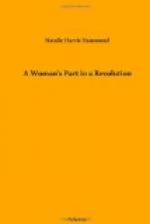First.—In answer to a telegram from Jameson, expressing restlessness at the delay, my husband wired him on December 27 a vigorous protest against his coming.
Second.—Strong and emphatic messages were taken by Major Heaney, one of Jameson’s own officers, to the same effect, also by Mr. Holden. Major Heaney went by special train from Kimberley, and Mr. Holden on horseback across country.
These messages informed Dr. Jameson that the time had not arrived for his coming; that the people of Johannesburg were without arms, and that his coming would defeat the aim and purposes of the whole movement; and, further, that he could not expect any aid or co-operation from the people of Johannesburg.
Notwithstanding all this, Jameson left Pitsani Sunday night, and the first intimation which Johannesburg had of his advance was through telegrams received Monday afternoon.
The Reform Committee, thus informed of Jameson’s coming, and knowing that he was fully aware of their unarmed condition, believed that he relied only on his own forces to reach Johannesburg; and the Committee were assured by Major Heaney and Captain White (two of Jameson’s officers, the latter having two brothers with the invading force) that no Boer force could stop him in his march; and this was confirmed by one of Jameson’s troopers, who came from him this morning of the surrender, and reported that he was getting along well; that, although his horses were tired, he would reach Johannesburg within a few hours, and that he needed no assistance.
The hope of the Committee was that, after receiving the proclamation of the High Commissioner, Jameson would retrace his steps instead of pushing on.
Monday, when we first heard of his starting, there were only 1,000 guns, and very little ammunition in the country, and these were hidden away at the different mines. One thousand five hundred more guns arrived next day. So desperate was the extremity, these guns were smuggled in at great risk of being discovered by the Boer Custom House officials, under a thin covering of coke on ordinary coal cars. But for the bold courage of several men, who rushed the coke through, they would have fallen into the hands of the Boers. The leaders had taken as few men as was possible into their confidence, so as to reduce to a minimum all liability of their plans being discovered by the Government. They had made almost no organisation, and Jameson’s sudden oncoming placed them in a terrible position. To confess at this juncture that the Reform Committee was short of guns would have demoralised the people, and placed Johannesburg entirely at the mercy of the Boers. These leaders played a losing game with splendid courage. Realising that all would be lost if the true situation were suspected, and feeling the fearful responsibility of their position, they kept their counsel, and turned bold faces to the world, continuing to treat with Government with the independence of well-armed men, and men ready to fight.




